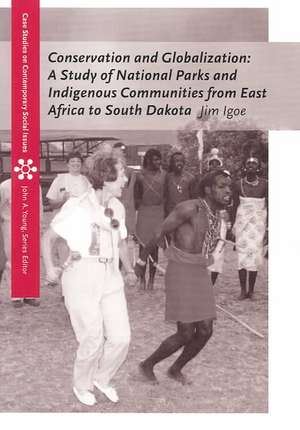Conservation and Globalization: A Study of National Parks and Indigenous Communities from East Africa to South Dakota
Autor Jim Igoe Editat de Wadsworth Publishingen Limba Engleză Paperback – 31 iul 2003
Preț: 364.54 lei
Preț vechi: 480.48 lei
-24% Nou
Puncte Express: 547
Preț estimativ în valută:
69.75€ • 72.83$ • 57.73£
69.75€ • 72.83$ • 57.73£
Carte indisponibilă temporar
Doresc să fiu notificat când acest titlu va fi disponibil:
Se trimite...
Preluare comenzi: 021 569.72.76
Specificații
ISBN-13: 9780534613174
ISBN-10: 0534613179
Pagini: 200
Ilustrații: Illustrations, maps
Dimensiuni: 161 x 238 x 8 mm
Greutate: 0.27 kg
Editura: Wadsworth Publishing
Locul publicării:United States
ISBN-10: 0534613179
Pagini: 200
Ilustrații: Illustrations, maps
Dimensiuni: 161 x 238 x 8 mm
Greutate: 0.27 kg
Editura: Wadsworth Publishing
Locul publicării:United States
Recenzii
1. Seeing Conservation through the Global Lens. 2. A Clash of Two Conservation Models. 3. Fortress Conservation: A Social History of National Parks. 4. The Maasai NGO Movement and Tanzania's Transition from Fortress Conservation to Community-Based Conservation. 5. National Parks and Indigenous Communities: A Global Perspective. Bibliography.
Notă biografică
Jim Igoe is Assistant Professor of Anthropology at the University of Colorado at Denver. He received his doctorate in sociocultural anthropology from Boston University in 1999. He has conducted extensive fieldwork in the Arusha region of Tanzania. His research has focused on the formation of Non-Governmental Organizations (NGOs) in pastoral communities in general, and the impact of NGOs on Maasai and Barabaig ethnic communities in particular, as well as the complexities of the interaction of international, national and local agendas. Additional research focused on the implementation of community-based conservation projects and the relationship of local people to national parks. Igoe's current teaching and research interests include human ecosystems and the limits of the western conservation models; community ecological anthropology; community conservation; developmental anthropology with an emphasis on NGOs; and the history of anthropological theory.
